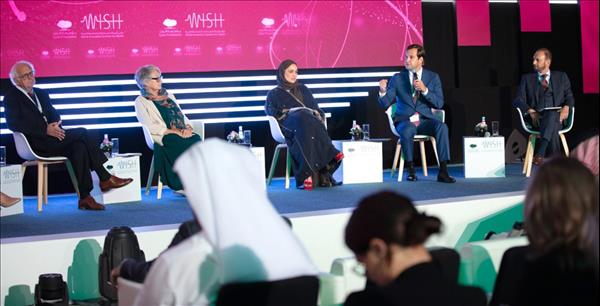
Medical Experts At WISH Discuss Pandemic-Proof Future Healthcare Facilities
Doha: A report on 'Building Better Hospitals for the Future: Lessons from the COVID-19 Pandemic, was released at Qatar Foundation's World Innovation Summit for Health (WISH 2022), and experts highlighted key findings of the report.
Prof. Didier Houssin, President, AP-HPI, France, and author of the report, spoke about the COVID-19 impact on hospitals during the pandemic.
Read Also“The impact of the pandemic on the health of individuals was very clear, and in some cases, there was a severe acceleration in the spread of infection,” he said, adding“it has had a significant impact on the capabilities of healthcare systems and hospitals.”
Prof. Houssin explained the main difficulties hospitals faced.
“Some hospitals were affected with a shortage of healthcare workers, beds in intensive care units, no respirators, oxygen equipment or personal protection, such as face masks, which are very important for doctors and nurses who are directly exposed to the virus. The worst thing that happened was that people died in hospitals without their families being able to visit them.”
Prof. Christine Rouzioux, Professor of Virology at University Paris Descartes, said:“We are not sure what will happen after this pandemic. The virus has no borders, and the story is not over yet, but we all realise now that we need to develop new technology, cooperate, and share experiences and exchange data between us to overcome such pandemics in the future.”
It was mentioned in the report that since the onset of the COVID-19 pandemic, many hospitals have been ill-equipped to handle the increased demand for services brought on by the virus, and they have not been able to adapt when it came to reallocating resources during the crisis.
Dr. Muna Al Maslamani, Medical Director of Hamad Medical Corporation's Communicable Disease Hospital, said:“Fortunately, in Qatar, we did not experience the first wave of the pandemic as some countries in the West did. We immediately put together a precautionary plan.
“In the beginning of the pandemic, we faced many challenges, the first of which was how to deal with COVID-19 cases, and receive them in the hospitals. We had to make a decision between receiving cases in all hospitals or allocating a specific number of hospitals for COVID-19 cases, as receiving cases in all hospitals would have caused the disease to spread more widely. And this could affect our goal of keeping patients and our community safe.”
Al Maslamani indicated that the shortage of medical workers and tools was one of the challenges Qatar faced.
“The shortage was a global challenge, and not limited to Qatar. Therefore, we appointed a lot of physician assistants to help us in all our healthcare facilities designated for COVID-19 cases.”
The main weaknesses that the report identified in how hospitals can improve highlighted hospital design and engineering, provision of medical equipment and tools, efficient workforce and operational planning, and safety.
Dr. Ricardo Baptista Leite, Founder & President of UNITE, said:“We need to be more efficient, able to make quick decisions and adapt to any new situation. No matter how advanced hospitals or medical staff are, when the number of infections exceeds a certain limit, we will not be able to respond, and I think this is a lesson that can be learned from the pandemic.”
Prof. Mahmood Adil, Advisor to the Minister of Ministry of Public Health, Qatar, pointed to the importance of cooperation and working closely with the authorities, and sharing data to overcome this pandemic and others in the future. “During the pandemic, every country has done its best to use data, but it is not enough, we need to think about knowing the best ways that we can by sharing this data with the medical staff to benefit from it,” he said.

Legal Disclaimer:
MENAFN provides the information “as is” without warranty of any kind. We do not accept any responsibility or liability for the accuracy, content, images, videos, licenses, completeness, legality, or reliability of the information contained in this article. If you have any complaints or copyright issues related to this article, kindly contact the provider above.






















Comments
No comment